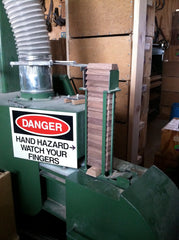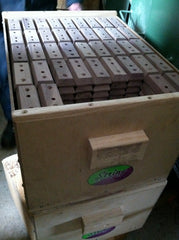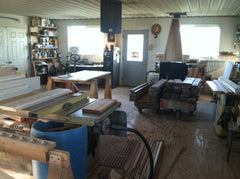Learn More About Our Amish Manufacturers
OUR AMISH CONNECTION
Our cases can be made by anyone with advanced carpentry skills. In the past, we contracted with several local cabinet shops and still have some cases in our inventory that were made by these businesses. We have them labeled as “2nd Quality” because they can’t touch the Amish craftsmanship. We simply don’t sell them to our customers because they aren’t even close to the same level as what our builder now does. We have been asked more than a few times, why keep using local carpenters and not get into mass production of your cases? Why not use plywood laminates? Why not substitute handmade quality for computer navigated cutting (CNC) machines?
It’s a simple answer: the Amish produce handmade, heirloom quality cases and take tremendous pride in their work. There are some similarities to the guitar business – Taylor and Paul Reed Smith make no bones about certain components being mass-produced. They have perfected the ability to make each and every neck within 1/100” of the last one. Their customers know what to expect when they pick up their guitars and some people desire that comfort level. I have nothing against either of these companies and in fact own a Taylor myself (and definitely want a PRS soon!), but sometimes a small boutique feel is better. A contrasting style would be how Santa Cruz Guitar Company, Froggy Bottom, and several small shop luthiers approach their craft….the old-fashioned way, one at a time, creating a deep connection between the maker and the instrument.
Our take on the situation is that Acoustic Remedy Cases will remain handmade in small batches and the product will reflect the passion, patience, and quality of the Amish. The more I learn about the Amish and their unmistaken first-class woodworking abilities, the more I marvel at their deep understanding of the woods they use, their wisdom passed down over many generations, their unique tools, and their creative intuition that often leaves me speechless. They are utilizing age-old processes and techniques that involve a hands-on approach to their work. It’s also an understanding of how to work in harmony with the different attributes of woods. All of this is a lost art in the age of computerized manufacturing and the fast paced world we live in.
Often times we are asked how we met the Amish. Well…..it all starts with the owner of String Swing, Paul Thieman. We met Paul in 2010 at Larry Fest - a bluegrass festival in the coulees of Western Wisconsin. We had a small tent displaying some of the earliest cases ever produced by Acoustic Remedy Cases. These cases were made in a small woodworking shop in Ryan’s garage. With the help of my dad (who is a lifelong carpenter at the University of Wisconsin), both Ryan and I spent countless hours that summer creating the first cases made out of locally sourced birch lumber.
Paul happens to be a very successful businessman who basically started creating his String Swing instrument holders in his basement (www.stringswing.com). He now owns a couple manufacturing facilities in Ontario, Wisconsin where the company produces about 300,000 String Swings per year and consistently has marquee, megastar artists who use and endorse their products. He had some questions for us when we first met and some extremely simple advice - you guys should be selling these and not making them. Following our initial brief meeting, we kept in contact and eventually met up for lunch. He provided us with more good pointers, some key contacts in the industry, and asked us a question that turned our business on its head and helped us to succeed. He asked us if we wanted to meet an Amish carpenter that he subcontracts, to which we emphatically said “YES!”
The wise, friendly and witty man was named Joseph Kempf. He makes the small wood blocks that are used with the most popular version of the String Swing. He created a machine that is 100% mechanical (no electricity) that sands all four sides of the blocks, drills two holes, and kicks them out the other end. It takes some creative engineering and countless hours to build a machine like this. In fact, he was told by a metal fabricator that the machine couldn’t be built….it was impossible. So he set out to prove them wrong and built a prototype completely out of wood. He then brought it to the metal fabricator and showed them it was possible to make. He immediately commissioned them to make the entire machine out of metal by using his prototype. Here are a couple pictures during a recent visit to his workshop.


We showed Joseph a drawing of our cases and asked him if he was interested in making them for us. He looked it over and decided that he was too busy, but said that his son Enos was looking for work. We gave Joseph our phone number and Enos called us the next week. A few weeks later, we brought out some prototypes to Enos. He made some measurements and produced the first Amish built ClimaStand in 2011. We were very pleased with the results and immediately placed an order of 10 cases. Ever since the first batch, we have used Enos as our primary manufacturer and our product has improved by leaps and bounds. Fine cabinetry skills are utilized in every faction of the cases, from the intricate joint work to the precise measurements and cuts. Every case is handcrafted artistry. We are consistently tweaking and redesigning features and components to always push the product to higher levels. His input has been essential for us to bring the world’s best display case to our customers. Sometimes we have hour-long brainstorming sessions in his workshop that inspire new ideas or concepts. Our ability to work with Enos has proved to be the best thing that ever happened to ARC to date.
We have the honor of saying that he’s our friend and have developed a great relationship with him. We been invited into his house, shared meals with him and his family, and learned some of the old German dialect and about their culture. We have purchased produce and livestock from him and delighted in some of the best apple pie and cinnamon rolls this world has to offer. Enos also happened to introduce us to the finisher we have used on every case – who is undoubtedly the other half of the Amish connection. Reuben Miller is an absolute wizard when it comes to applying a consistently perfect finish and how he accomplishes it is quite cool indeed. A hydraulic system uses a series of weights to pressurize a small tank to the correct PSI necessary for spraying the finish. No air compressor in his shop!!
It’s been quite the experience meeting the Amish and developing a business and personal relationship with them. Something that both Ryan and I will not ever forget! But to top it all off, our cases have become an example of the unbelievable craftsmanship and attention to detail that Amish woodworkers are renowned for.
~ ADAM







Leave a comment